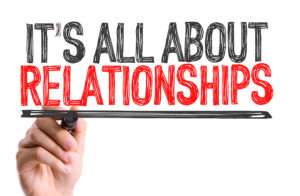“Too often, companies fail to cultivate relationships with key decision-makers until a crisis hits, at which point it’s too late. Know the cell phone numbers of such people so that you can call them on Sunday night in real time, not after the fact on Monday morning.”
— Jaap de Hoop Scheffer, Former Secretary-General, NATO
Make friends before you need them
I guess this is the easiest way I can say this: you either want a life connection or you don’t.
I wouldn’t say that I’m a “networker” per se, although some people observing me might think I am. Rather, I like to forge long-term connections with people around shared interests — and only some of the time is that standard business. Much more of the time, it’s food, wine, theater, technology, or other passions. Hopefully, you have read my blog on this topic: Aim for life connections instead of networking.

The thing that bothers me in any discussion about relationship-building or standard networking is that often, the lesson seems to be that you connect with people when you need them. I disagree. I don’t want to be called when you need me if you had no interest before that. You either want the life connection or you don’t. It’s not contextual to “I need something now.”
The executive recruiter who placed me in my current role is the same recruiter who placed me in my role at Aon several years ago. He periodically checked in on me and had set a recurring event on his calendar marking the anniversary of my Aon start date. Just over three years ago, he reached out to me on this anniversary and we arranged a breakfast. That breakfast led to the introduction to, and unlikely connection with, my current company. It came as a result of a life connection – a relationship – not because I was looking for a role.
I have other recruiters in my “network” who call and email aggressively when they are trying to fill a role, yet never reach out in between. And how many emails do I get from people who worked for me years ago saying something like “Hi, I know it has been years since we have spoken but I am now looking for a job. Can you help?”
Or how about those family members or friends who don’t reach out to you for years, then one day, ask for money or favors? It happens far too often. Thus, my rant.
Make friends before you need them.
People want to feel needed and loved all the time, and not simply when you want their help or need something. And by “people,” I would definitely include myself.
But how do you do this? Here are a few tips.
Always use social media cheats.
Facebook and LinkedIn remind you of special occasions and make it very easy to say happy birthday or congrats to peeps in your circle. Use them. This is a great, quick way to say hello and it keeps your name fresh in their minds.  Use the “you might know” feature too. Every social platform has a variation of this. It turns out that your high school football teammate married someone who works at a company you admire. Reach out immediately. Don’t wait until you decide to pursue a job at that company. By that point, it’s too late.
Use the “you might know” feature too. Every social platform has a variation of this. It turns out that your high school football teammate married someone who works at a company you admire. Reach out immediately. Don’t wait until you decide to pursue a job at that company. By that point, it’s too late.
Buy stamps and custom note cards and use them.
I bought each of my nieces and my nephew 36 thank you notes and urged them to use them throughout the year. That is less than one personal note each week but likely about 34 more than they sent last year. Email is easy and crowded. Online billing and electronic advertising have resulted in snail mail being predominantly political crap and charities. Take advantage of the gap and send a personal card. The average white collar professional gets 120+ emails per day; often it feels like more than that. Email gets lost. A card will not and will ultimately mean more than a few email lines or something on Facebook.

Pick up the phone instead of flipping your middle finger.
Commuting is not fun. More than half of Americans spend at least 40 minutes in their round-trip commute. Nobel laureate Daniel Kahneman and his team found that people find as much happiness in commuting as they do in housework. That pretty much means that the commute stinks.
Do you have to drive everyday and often get stuck in traffic? Use that time for calls NOT related to work. Talking work AND dealing with stress, unless you REALLY like your job, will increase likelihood of road rage. Call someone funny that you haven’t heard from in years. Call the woman you heard started an amazing company this year. Call your allegedly best friend you have likely only touched via texts for at least a week. If you are on a train for your commute, commit to handwriting a note or sending an email to someone with whom you have not connected in 6 months.
Say yes more.
Saying yes to more opportunities opens up a world of new life connections, allowing you to expand your world beyond the immediate circle. While sometimes this may mean going beyond that with which you are normally comfortable, it will open you up to more people who you may be able to help and who may be able to help you. Plus, it helps you live a more optimal life.
Go to those reunions. Accept random coffee requests. Return the call of those headhunters and agree to exploratory interviews. Think about how many work events you go to because you feel you have to. Make at least a similar amount of time available for yoga, small venue concerts, and that pottery class you considered twenty years ago. Actually talk to the parents waiting with you when you pick up your kids from school or attend the soccer match.
Taking a risk and doing something different can be both liberating and empowering. If you normally hesitate when asked, for example, to volunteer for something, saying yes might lead to rewarding personal and professional results today and later on when you need help.
Maintain an events and occasions calendar.
This can be especially relevant if you change jobs frequently. Use Google or a private email server for this given birthdays are for life. Record special dates of coworkers, former coworkers or cool people you meet. Don’t be creepy, but sending a note that says “Hey. Just realized the annual blah Blah blah event is coming up. It was such a pleasure sitting at the table with you and Sally last year I thought I would reach out to see if you were attending this year. Want to join me again?” Simple and not creepy.
Call someone today.
When a job comes up or there’s a chance to start a new company or any other opportunity is “public,” it’s already too late. The core people are already known and in the system contextually. When you need help, or are in the midst of a crisis, it is so much harder to find help in the moment. If you want to be one of those core people for any opportunity, or to be able to connect with help in a crisis, you absolutely need to make friends before you need them.
Be well. Lead On.
Adam

Adam L. Stanley Connections Blog
Technology. Leadership. Food. Life.
Follow me on Twitter | Connect with me on Linked In | “Like” me on Facebook
Related Posts:

